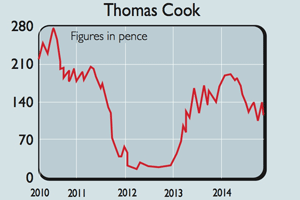
If there’s one thing the stockmarket hates more than anything else, it’s the unexpected. So when travel operator Thomas Cook (LSE: TCG) announced last week that its chief executive, Harriet Green, was stepping down with immediate effect, shocked investors decided to dump the shares. They fell by nearly 20% last Wednesday.
However, while Green’s departure was the headline-grabber, it’s just as likely that investors were spooked by the more downbeat outlook on current trading that was also announced by the company.
Investors could be forgiven for wondering whether Green was jumping ship before things turned sour, as many other CEOs have done before her.
To tell the truth, I think investors have overreacted. There’s no doubt that Green has done a fabulous job in reviving Thomas Cook from near disaster just over two years ago.
When she took over the reins, the company was in dire straits and the shares were just 14p each. A fresh strategy and the slashing of hundreds of millions in costs have restored the company to health.
But is her departure the disaster the share-price reaction implied? I think not. As a company, Thomas Cook is undoubtedly more than just Harriet Green.
The new man in charge, Peter Frankhauser, is hardly a travel industry novice. He has a lot more industry experience than Green, with 20 years in the trade. He reputedly did a very good job running the European business of rival Kuoni. He may actually be a better choice to take the company forward.
The slightly gloomy future profits outlook doesn’t look all that bad either. Sure, profits will probably not grow by as much as people had previously expected, but there’s still a lot of grounds for optimism.
The first part of the cost-savings plan has beaten expectations, saving £500m rather than the £460m originally expected. Cash generation is expected to remain impressive, as net debt is set to fall from £326m to £100m-£150m next year. All of this suggests to me that the intrinsic value of the company is continuing to increase.
I tipped the shares at 118p back in early October. They are now back to around that level.
On last year’s trading profits of £323m – which look like being higher next year – and current net borrowings of £326m, the company has an earnings before interest and tax (EBIT) yield of 15.8%. Despite the ups and downs that travel operators will undoubtedly experience, that looks too cheap to me. The shares still look worth buying.
Verdict: buy